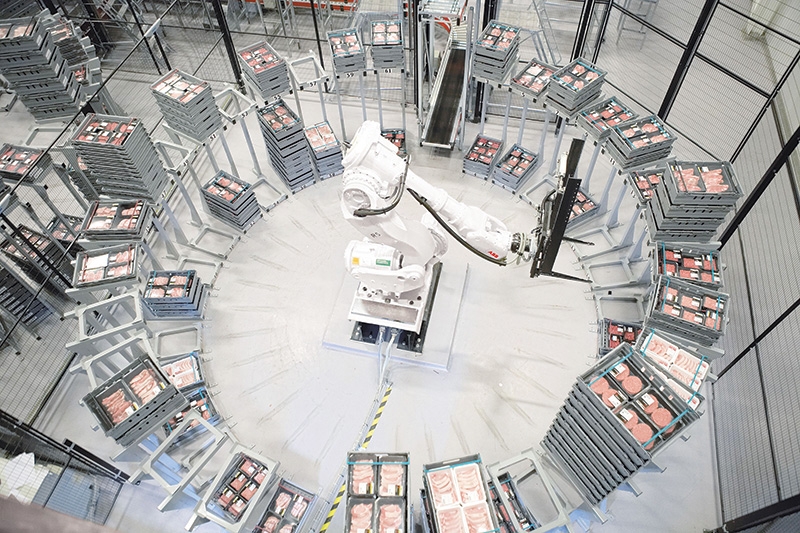ABB shapes sustainable future with 4.0 solutions
 |
The productivity and competitiveness of Vietnamese enterprises remain low, according to a report by Vietnam Academy of Social Sciences, the Ministry of Planning and Investment, and the UN Development Programme. How can ABB solutions contribute to coping with this issue?
In smart manufacturing and production, ABB smart technologies help customers advance to the next level via automation, energy efficiency, and higher productivity. Connecting efficiency and productivity is a key for the future of the industrial sectors.
Our solutions to meet customers’ biggest challenges include shorter product cycles, more frequent launches, reduced cost of downtime, higher reliability, as well as increased human and robot interaction.
Robots have a critical role in the factory of the future. Producers are now deploying advanced robotics as an essential element of advanced automation. Enhancing plant structures and processes with digital technologies can increase productivity and flexibility in both the factory and the supply chain, enabling producers to rapidly adjust to changing customer needs.
Compared to the traditional caged robots, collaborative robots – or cobots – can work safely alongside humans without fences to complete one or more tasks in a collaborative and efficient way. For example, a single-arm YuMi robot, developed by ABB, can be used to feed parts to a dual-arm YuMi to speed up cycle time or can be added as an extra arm to integrate a testing and inspection station into an electronics assembly application. The single-arm type also features the same intuitive, easy-to-use lead through programming as the dual-arm, meaning even workers without special training can set up and operate it. Combining this simplicity with the robot’s deployment flexibility can help manufacturers in many industries offset the shortage of skilled workers.
In particular, ABB Ability™, ABB’s unique cloud automation platform, helps customers to harness the power of the industrial Internet of Things. It accelerates the creation of innovative software applications and services in co-operation with customers, turning data insights into direct action and generating customer value in the physical world.
ABB Ability™ enhances customers’ ability to innovate and compete in the digital-industrial marketplace. ABB Ability™ helps customers in utilities, industry, transport, and infrastructure develop new processes and advance existing ones by providing insights and optimising planning and controls for real-time operations. The results can then be fed into control systems to improve key metrics such as factory uptime, speed, and yield.
For detail, in the industrial sector, by applying ABB Ability™, our customers have improved productivity (over 200 per cent), reduced energy (30 per cent), and lengthen products’ life (over 30 per cent).
How would you encourage smaller companies to automate their processes?
More simplicity in installation, programming, and usage of robots will increasingly help small- and medium-sized enterprises (SMEs). The new generation of cobots is also changing the game for smaller manufacturers, helping them compete more effectively, offering new opportunities for employees, and even improving safety.
The biggest encouragement for companies is in understanding the benefits of automation. There are four key performance indicators (KPIs) that most manufacturers track, no matter how big or small: cost, quality, safety, and sustainability. Even small investments in automation and robotics will have positive impacts on each of these KPIs. It is also important for the companies to know that it is not an ‘all or nothing’ investment in automation, and that they can automate in steps. They can make these changes and have those improvements essentially pay for the next ones.
According to a World Economic Forum (WEF) report, the three trends of electrification, digitalisation, and decentralisation will define technology innovations. How will this affect Vietnam?
The trends are very relevant from Vietnam’s perspective. With renewable energy generation, especially solar energy growing rapidly with the government’s supporting initiatives, electrification is seeing unprecedented changes in terms of distributed energy sources, storage, solar roof-tops, and electric vehicles and charging infrastructure getting integrated in the electric network. Electricity consumers will also act like producers during off-peak load periods. Distributed energy sources, together with micro-grid and nano-grid concepts, will make the grid more decentralised. An industry parallel to this would be SMEs, together with large enterprises, to make industrial manufacturing decentralised with an ecosystem of collaborative, flexible manufacturing.
With the dynamics of electrification and decentralisation, digitalisation plays a key role in providing real-time information and data about production, weather forecast, market and consumer demand-response, and usage behaviours to optimise energy and industrial production in real-time. This is realised with smart sensors, faster communication, remote monitoring, cloud computing, and Big Data analytics. ABB has been working closely with the WEF on themes such as the future of production, energy transformation, and of late, the Centre for Fourth Industrial Revolution.
 |
| Support from the government can put more educational focus on digital tech such as machine learning and AI |
How strong is Vietnam in the adoption of key technologies?
As a pioneering technology leader serving utilities, industry, transport, and infrastructure, ABB is at the heart of the Fourth Industrial Revolution. With its leading market position in power transmission, industrial control systems, robotics, marine and electric vehicle charging, ABB helps its customers take advantage of the efficiency and performance improvements that digitalisation delivers.
To keep its competitive edge in the global market, Vietnam needs to adopt industry digitalisation – advanced manufacturing through robotics and automation – another area where ABB can contribute.
We believe the Vietnamese government can provide support in three ways, including education that should focus on digital technologies like machine learning, artificial intelligence (AI), robotics in both vocational and tertiary education, stimulating adoption – through fiscal incentives to industry players and mandating smart technology in government tenders as well as focusing on local innovation – as well as supporting and encouraging local startups and fostering a partnership model between the industry, the government, and the academia in new-age technologies (AI, machine learning, and robotics). As with any individual or company, or every nation – we all have to make a choice – a choice to lead or to follow, and ABB has chosen to lead.
How does ABB promote smart manufacturing in Vietnam?
For the past more than 26 years, taking the lead in Vietnam’s energy and automation segments, ABB has participated in several important projects in the country, including powering and automating major industrial plants operating in different economic sectors, to help customers improve energy efficiency and minimise environmental impacts.
With our technology leadership and global experience and competent service team nationwide, ABB is committed to enabling the integration process and seizing opportunities to help build up a digital future for Vietnamese industries.
It is essential for Vietnam to raise awareness of digital economy, in which three main factors play important role, including highly qualified human resources, technology, and cybersecurity.
Thus, ABB attaches great importance to promoting education, specifically the training of engineers. ABB in Vietnam has donated its latest technologies to leading engineering universities. These types of equipment bring practical work processes and experience into the learning environment. We have also opened Vietnam’s first robotics technical and service centre in the north to support businesses to deploy advanced manufacturing technologies.
Vietnam is at an exciting phase of its development. We have seen large local companies such as VinFast using the latest technologies at their manufacturing base or state corporations such as Electricity of Vietnam starting to look for digital management solutions. Whether it is about delivering smart cities, smart factories, smart grids or renewable energy or electric vehicles, we look forward to continuing to bring ABB’s innovative technologies to the country.
Moreover, at our own factories, we have installed manufacturing execution systems to provide real-time information on the manufacturing process. At our high-voltage component factory in the northern province of Bac Ninh that came into operation in 2010, we trace the sources of materials of all products through these systems.
We also use ABB smart sensors to monitor the performance of our robot motors and send alerts if key parameters such as temperature or vibration cross certain thresholds. The on-site waste water plant is monitored and controlled, and all the information is available in the cloud to allow optimisation and remote monitoring.
In addition, the ABB pilot solar plant came online last year and is monitored through Internet of Things technology, making the data readily available.
What the stars mean:
★ Poor ★ ★ Promising ★★★ Good ★★★★ Very good ★★★★★ Exceptional
Themes: SMART SUSTAINABILITY
Related Contents
Latest News
More News
- SK Innovation-led consortium wins $2.3 billion LNG project in Nghe An (February 25, 2026 | 07:56)
- THACO opens $70 million manufacturing complex in Danang (February 25, 2026 | 07:54)
- Phu Quoc International Airport expansion approved to meet rising demand (February 24, 2026 | 10:00)
- Bac Giang International Logistics Centre faces land clearance barrier (February 24, 2026 | 08:00)
- Bright prospects abound in European investment (February 19, 2026 | 20:27)
- Internal strengths attest to commitment to progress (February 19, 2026 | 20:13)
- Vietnam, New Zealand seek level-up in ties (February 19, 2026 | 18:06)
- Untapped potential in relations with Indonesia (February 19, 2026 | 17:56)
- German strengths match Vietnamese aspirations (February 19, 2026 | 17:40)
- Kim Long Motor and AOJ Suzhou enter strategic partnership (February 16, 2026 | 13:27)

 Tag:
Tag:




















 Mobile Version
Mobile Version